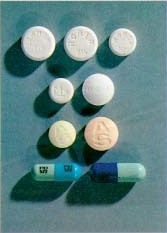Club drug
Club drugs refer to a category of psychoactive drugs that are commonly used in nightclubs, music festivals, concerts, and parties to enhance social intimacy and sensory stimulation. These substances vary widely in their chemical composition and effects, ranging from stimulants and hallucinogens to dissociatives and depressants. The use of club drugs has been associated with significant health risks and social issues, including substance abuse, addiction, overdose, and the transmission of infectious diseases.
Types of Club Drugs[edit | edit source]
The most commonly recognized club drugs include, but are not limited to, the following substances:
- MDMA (Ecstasy or Molly) - Known for its stimulant and empathogenic effects, MDMA enhances feelings of empathy, love, and emotional closeness.
- Ketamine - A dissociative anesthetic that produces feelings of detachment from one's body and the environment.
- LSD (Lysergic acid diethylamide) - A potent hallucinogen that induces vivid hallucinations and a distorted sense of time and space.
- GHB (Gamma-hydroxybutyric acid) - A central nervous system depressant used for its euphoric, sedative, and anabolic (body-building) effects.
- Methamphetamine - A powerful stimulant that affects the central nervous system, known for its high potential for addiction and abuse.
- Cocaine - A stimulant drug extracted from the coca plant, which increases levels of dopamine in the brain circuits regulating pleasure and movement.
Health Risks and Concerns[edit | edit source]
The use of club drugs can lead to a range of adverse health effects, including:
- Neurotoxicity and cognitive impairment
- Increased risk of contracting HIV/AIDS and other sexually transmitted infections (STIs) due to lowered inhibitions and risky sexual behaviors
- Acute adverse reactions, such as hyperthermia, dehydration, and serotonin syndrome
- Psychological effects, including anxiety, paranoia, and psychosis
- Dependence and addiction
Prevention and Treatment[edit | edit source]
Efforts to address the use of club drugs include education and awareness campaigns targeting young adults about the risks associated with drug use, as well as the development of harm reduction strategies at venues where these drugs are commonly used. Treatment for club drug addiction typically involves a combination of behavioral therapies, counseling, and, in some cases, medications to manage withdrawal symptoms and promote recovery.
Legal Status[edit | edit source]
The legal status of club drugs varies by country and substance. Many of these drugs are controlled substances, making their possession, distribution, and use illegal without a prescription or other authorization. Law enforcement agencies and public health officials work together to combat the illegal trade and use of these substances.
This substance-related article is a stub. You can help WikiMD by expanding it.
Search WikiMD
Ad.Tired of being Overweight? Try W8MD's physician weight loss program.
Semaglutide (Ozempic / Wegovy and Tirzepatide (Mounjaro / Zepbound) available.
Advertise on WikiMD
|
WikiMD's Wellness Encyclopedia |
| Let Food Be Thy Medicine Medicine Thy Food - Hippocrates |
Translate this page: - East Asian
中文,
日本,
한국어,
South Asian
हिन्दी,
தமிழ்,
తెలుగు,
Urdu,
ಕನ್ನಡ,
Southeast Asian
Indonesian,
Vietnamese,
Thai,
မြန်မာဘာသာ,
বাংলা
European
español,
Deutsch,
français,
Greek,
português do Brasil,
polski,
română,
русский,
Nederlands,
norsk,
svenska,
suomi,
Italian
Middle Eastern & African
عربى,
Turkish,
Persian,
Hebrew,
Afrikaans,
isiZulu,
Kiswahili,
Other
Bulgarian,
Hungarian,
Czech,
Swedish,
മലയാളം,
मराठी,
ਪੰਜਾਬੀ,
ગુજરાતી,
Portuguese,
Ukrainian
Medical Disclaimer: WikiMD is not a substitute for professional medical advice. The information on WikiMD is provided as an information resource only, may be incorrect, outdated or misleading, and is not to be used or relied on for any diagnostic or treatment purposes. Please consult your health care provider before making any healthcare decisions or for guidance about a specific medical condition. WikiMD expressly disclaims responsibility, and shall have no liability, for any damages, loss, injury, or liability whatsoever suffered as a result of your reliance on the information contained in this site. By visiting this site you agree to the foregoing terms and conditions, which may from time to time be changed or supplemented by WikiMD. If you do not agree to the foregoing terms and conditions, you should not enter or use this site. See full disclaimer.
Credits:Most images are courtesy of Wikimedia commons, and templates, categories Wikipedia, licensed under CC BY SA or similar.
Contributors: Prab R. Tumpati, MD





